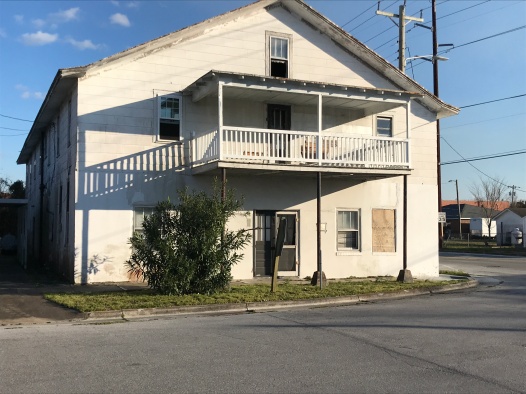
The Godette Hotel. Beaufort, N.C. Photo by David Cecelski
Beaufort, N.C. At the corner of Pollock and Cedar Street in this lovely historic town on the North Carolina coast, the Godette Hotel is a forgotten African American historical landmark that could have come straight out of the Academy Award-winning movie Green Book.
The Hollywood movie is based on The Negro Motorist Green-Book, a guide that was published between 1933 and 1966. It listed hotels, restaurants and other black-owned businesses where black travelers could be confidant of being welcomed with dignity and respect in a Jim Crow South where white-owned hotels and restaurants turned them away.
The Godette Hotel was once Beaufort’s version of a Green Book hotel and restaurant. Back in those days, the town’s waterfront restaurants all refused to serve black customers. The Godette Hotel welcomed them.

At the 91st Academy Awards, Green Book won Oscars for best movie, best original screenplay and best supporting actor. Courtesy, Universal Pictures
In the Jim Crow Era, every single one of the town’s seaside inns, boarding houses and tourist hotels refused to open their doors to black travelers. The Godette Hotel made them feel at home.
For decades signs at the town limits of other coastal towns even threatened black travelers if they entered the town after dark, even if they just wanted to shop or go to a movie.
Swansboro, 28 miles away from Beaufort in Onslow County, was one of those towns. It had a sign like that for decades. The sign read: “N—– don’t let the sun set on you in this town.”
Swansboro was not the only town or village near Beaufort that was so inhospitable to black travelers. More than one community in Carteret County, where Beaufort is, was that way, too.
The Godette Hotel, on the other hand, was a sanctuary and a refuge, open to all, no matter what color or background.
A HOTEL’S ROOTS
Built by a legendary African American carpenter and farmer named Henderson Godette, Sr. and eight of his sons soon after the Second World War, the Godette Hotel had 14 guest rooms upstairs and a restaurant, a big kitchen and a game room and dance floor downstairs.
Born in the Craven Corner community, on the east side of Clubfoot Creek, in 1889, Henderson Godette, Sr. was widely considered to be the area’s most accomplished African American builder of his day.

Henderson Godette, Sr. (1889-1974), master carpenter, builder and farmer. Courtesy, Verdelle Godette Newby
He had deep family roots in Carteret and Craven County. His father was a Bell, one of the oldest white families in Carteret County. (My mother was a Bell, by the way.)
On his mother’s side, he was descended from the Georges, an African American family that had land and freedom on the east side of Clubfoot Creek since at least the 1740s.
His mother, Nancy George, was a midwife in the Craven Corner/Harlowe area. She later married a Godette, and all of her children took the Godette name at that time.
Though Henderson Godette, Sr., had hardly any formal schooling and could not read or write, he possessed a sharp intelligence, a keen mathematical mind and a strong architectural vision.
He had the ability to do fine architectural work, such as his Arts and Crafts-style addition and renovation at the William Nash Bell House on Highway 101 (my mother’s homeplace) ca. 1938.

Craven Corner Missionary Baptist Church, Harlowe, N.C. Photo by David Cecelski
You can also find many other homes that he built in and around Harlowe, as well as public architecture such as the Craven Corner Missionary Baptist Church on the Adams Creek Road.
Henderson Godette, Sr., also built plainer, functional buildings, such as the old Red & White Grocery in Beaufort and Lionel Connor’s bowling alley in Havelock, which was originally built to serve the recreational needs of Marines and defense workers at Cherry Point.
MANNIX GODETTE’S LEGACY
When Henderson Godette, Sr. and his sons built the Godette Hotel ca. 1946-47, they did so for one of those sons. His name was Henderson “Mannix” Godette, Jr.
Mannix Godette was the third of Henderson, Sr. and Lucinda Godette’s children and he was a soft-spoken, hard driving farmer who tended four different farms along Highway 101 between Harlowe and Beaufort.
He was, I have heard people say, all business. Mannix Godette was known for working hard and he believed in self-reliance. He did not want anyone in his family to take help from anybody.
I have talked to those that think he drove people too hard, including those he loved.
But he was also what people used to call “a race man.” He believed in standing up for himself, his family and his community.
A typical incident was this: his son-in-law Charles McDonald (who later became Beaufort’s first black chief-of-police) was once the president of the local longshoreman’s union at the Port Terminal.
In the 1970s the longshoremen’s union went on strike for better pay and working conditions. The strike left many of the dockworkers hard pressed to pay their bills.
Mannix Godette was not the kind of man to walk a picket line, but he did do this: he offered to hire every single man that wanted a job during the strike on his farms—a remarkable act of solidarity and sacrifice that tells us a great deal about what kind of man he was.
“SHE WORKED HARD IN THAT PLACE”
When the Godette Hotel was completed, Mannix Godette and his wife Lucy Gray Godette and their three children moved into the upper floor. (Three more children came later.) Mannix continued to run the family farming enterprise with the help of the children.
The children grew up rising before first light, loading into the back of a pickup truck and working in the fields, often dawn to dusk, six days a week.
In those first years after the Second World War, Lucy Godette ran the hotel. Their youngest daughter, Glenda Godette McDonald of Beaufort, recently told me that the hotel was really her mother’s business.
Her husband Mannix paid the light and water bills, but Lucy took care of everything else. She hired the staff, managed the payroll and every evening at 8:30 carried a cigar box with the dollars and cents that she had made that day up to her room.
As we would say today, the Godette Hotel was “a woman-run business” at a time when very few women in Beaufort ran businesses.
“She worked from the time she got up at 5:30 till late night,” Glenda reminisced.
She made breakfast and supper for her family and the hotel’s guests. She stripped the beds every two days and washed the sheets on a washboard and set them out to dry.
“My God she worked hard in that place,” Glenda remembered. “But it took care of us.”
A GREEN BOOK HOTEL FOR EVERYBODY
Unlike Beaufort’s other hotels and inns, anyone of any color could stay at the Godette Hotel. However, nearly all of Lucy Godette’s guests were African American because African Americans had nowhere else to go.
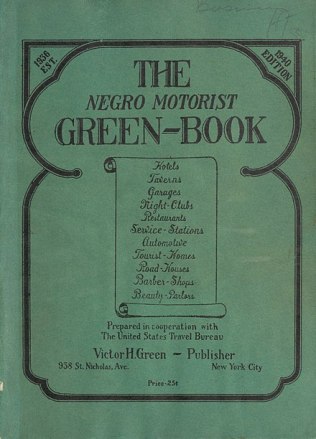
1940 edition of The Negro Motorist Green-Book. Courtesy, New York Public Library
Any stray black traveler or visitor to Beaufort quickly discovered that they could find a bed and a good meal there.
Was the Godette Hotel in The Negro Motorist Green-Book that inspired the Hollywood movie Green Book? No, the closest black-owned business that appeared in The Green Book was in New Bern, a town 40 miles from Beaufort.
But the Godette Hotel could have been in The Green Book. That’s why I have chosen to call it “Beaufort’s Historic Green Book Hotel.”
The only reason it wasn’t in The Green Book is because the Godette family did not feel the need to advertise in The Negro Motorist’s Green Book, so neither their hotel nor the restaurant was listed there.
In addition, The Negro Motorist’s Green Book tended to feature hotels and restaurants for a certain class of African American traveler—the ones that could afford automobiles and guide books. The Godette Hotel was for everybody.
BRIDGE BUILDERS & POGIE FISHERMEN
African American visitors from all walks of life stayed at the Godette Hotel. They could get a bed for $2.50 a night, stay a week for $7.00 or get breakfast, dinner and a bed for $15.00 a night.
Many of the Godette’s guests stayed only a night, but others stayed for months or even years.
A group of seven African American men from Charleston, S.C., for instance, stayed at the hotel for three years in the mid-1950s when they were part of the construction crew building the Grayden Paul Bridge.
“When the bridge guys came home, the food was on the table,” Glenda Godette Johnson recalled.
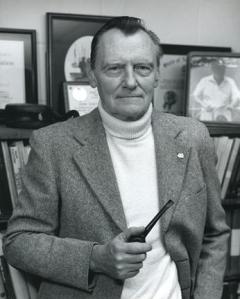
Dr. John Costlow, director of the Duke University Marine Lab and mayor of Beaufort in the 1960s. Photo by Scott Taylor.
Another time Dr. John Costlow arranged for four African graduate students to stay at the Godette Hotel while they were pursuing degrees at the Duke University Marine Laboratory.
Dr. Costlow was the director of the marine laboratory, but at that time he was also the mayor of Beaufort. A man of imposingly high standards, he would not have introduced the students to the Godettes if he was not absolutely confident that they would be well taken care of.
The Godette family also had regulars who returned to the hotel again and again over the years.
Menhaden (a.k.a., “pogie”) fishermen were among the regulars. At that time, the menhaden fishery was the town’s largest industry. From the end of October to the end of December, dozens of menhaden boats and as many as 1,500 crewmen crowded Beaufort’s docks.
The crews were nearly all African American and many of them came from menhaden fishing ports elsewhere on the southern coast. They came especially from Moss Point, Mississippi; Cameron, Louisiana; and Reedsville, Virginia.
When rough weather kept the boats in harbor, some of those men would leave the cramped bunks on their boats and spend a few nights at the Godette Hotel. Sometimes their wives traveled to Beaufort and joined them, too.

Menhaden fishermen at work near Beaufort, N.C. ca. 1930s-40s. Courtesy, Steve Goodwin
Here is what waited for them: a clean bed, a smile, Lucy Godette’s backbone stew and crowds of children that must have reminded many of them of their own families back home.
The hotel’s big downstairs room had two pool tables and a table where the guests played cards.
“When I was in my bed upstairs, I could hear the cards hitting that table,” Glenda Godette McDonald told me.
The hotel also had what people used to call a piccolo—a jukebox. Couples danced on Friday and Saturday nights, and Glenda remembers that a band from Kinston played there at least a few times, too.
A SOURCE OF COMMUNITY PRIDE
While the Godette Hotel’s story could have come straight out of Hollywood’s Green Book, the hotel wasn’t only a resting place for African American guests from distant places.
Mannix and Lucy Godette’s hotel was also an important community institution and a source of pride in black Beaufort.

Ed Carter, Harlowe native and former mayor of Greenville, N.C., recalls the Godette Hotel fondly. Courtesy, The Havelock News
Ed Carter remembers the Godette Hotel well. A retired army officer and research physicist, he grew up in Harlowe and became the first African American mayor of Greenville, N.C.
“We always prided ourselves on the Godette Hotel and on the Godette family,” he told me recently.
In those days you never knew who might drop by the hotel—civil rights pioneer Dr. Reginald Hawkins grew up just down the block. So did Nannie Branch Haley, the wife of Alex Haley, the author of Roots.
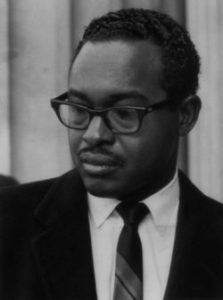
Born in Beaufort in 1923, Dr. Reginald Hawkins was one of Charlotte’s most important civil rights pioneers. Among much else, he led campaigns to desegregate the Mecklenburg County Schools and the North Carolina Dental Society. A close friend of the Dr. Martin Luther King, Jr., he was the first African American to run for governor in North Carolina in 1968. Photo courtesy, Elizabeth Reed
The esteemed educator Louis Randolph Johnson, Jr., no doubt visited the hotel as well. He was raised a stone’s throw from the Queen Street High School, a couple blocks from the Godette Hotel, and served as its principal from 1947 to 1968.
Principal Johnson may have asked the Godettes to take care of his many out-of-town guests or he may have just dined at the hotel’s restaurant. Either way the Godette Hotel was an important part of the community.
As Ed Carter told me, “We didn’t have any place else like the Godette Hotel. It was a matter of pride.”
“EVERYBODY FROM HARLOWE CAME IN THE BACKDOOR”
The Godette Hotel was an important community institution in another way, too. It was a home away from home for many of the children from Craven Corner, an African American neighborhood that is part of the Harlowe community, 15 miles north of Beaufort.
In a way the Godette Hotel served as a chord binding together the African American community in Craven Corner and the African American community in Beaufort.
Many of the Craven Corner children attended school at the Queen Street High School, the beloved African American high school that was located only two blocks from the Godette Hotel.
The Queen Street High School did not have a cafeteria, so at lunch the Craven Corner students paraded the two blocks to the Godette Hotel.
“Everybody from Harlowe came in the backdoor,” Glenda Godette McDonald remembered.
One of those children was her aunt, Mrs. Verdelle Godette Newby. Now a retired public school teacher from the Craven County Schools, Mrs. Newby is the last living child of Henderson Godette, Sr., the master carpenter and builder that constructed the Godette Hotel.
Mrs. Newby recently told me about those days when she was a student and used to visit the Godette Hotel at lunchtime.
She said that Lucy Godette would have lunch ready for them every day. She remembered 10 or 12 children being there at a time.
The children welcomed the hot meal, but they also enjoyed time with their friends and family. At the Godette Hotel, they felt as if they had found a little piece of Craven Corner right there in Beaufort.
A HOME AWAY FROM HOME
Some of the Craven Corner students at the Queen Street High School even boarded at the Godette Hotel. With no school bus service, they could not have attended high school otherwise.
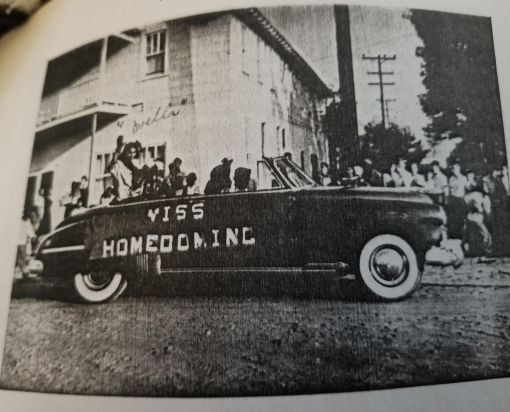
Miss Homecoming, Ms. Ovella Godette, and the Queen Street High School Homecoming Parade passing by the Godette Hotel in 1951. From the school’s annual, The Seagull. Courtesy, Esther Anderson Williams and Ellen Williams Cavanaugh
In those days, most of the Craven Corner children had to end their school careers when they finished the 8th grade at their local elementary school.
When the Godette Hotel opened, at least some of those children began to board at the hotel. They stayed at the hotel during the school week, and then went home to Craven Corner for weekends.
As they did so many wayfarers, Lucy Godette and her children looked out for them, fed them and gave them a safe, decent place to stay in the midst of Beaufort’s African American community.
Those children got the chance to get a head start on life, go onto college and make a better future—all thanks to the little hotel on the corner of Pollock and Cedar.
SAVING THE GODETTE HOTEL
I was inspired to write this story when I heard that the Town of Beaufort is making plans to demolish the Godette Hotel. It is true that the hotel has been closed for years and doesn’t look like much now.
I don’t know the inside-outs of politics and business in Beaufort, but I thought that some of the town’s citizens might not know what an important historical landmark was in danger and I wanted to share some of this history with them.
This week I have also talked with town officials and members of the Godette family that still own the property. In those conversations, I have learned that the hotel is a strong candidate for restoration and historic preservation if town leaders, private developers and historic preservationists will make a commitment to saving the building.
I have also learned that Beaufort’s Green Book hotel is not only an important historical landmark.
To Glenda Godette McDonald (who is one of the property’s owners), the hotel and its memories go deep into her heart.
“When I see that place, I see my momma, I see my daddy,” she told me. She also remembers the comfort, love and warmth of the African American community. She wonders if its memory will be lost in a wave of new resort development and gentrification.
Charles McDonald, her husband, echoed her concerns. “Beaufort strives to be a community that brings tourists to see our history, but there’s nothing here about its black history,” he said.
“Why,” he wondered, “are they trying to destroy all the black history in the community?”

David, your article about Beaufort’s Godette Hotel is your best ever. susu
LikeLiked by 2 people
David. My name is Marla Godette. I live in Indiana. It’s not a coincidence that I was in Charleston, SC in February wishing I had time to visit New Bern. Please contact me regarding the Godette hotel. I am on Facebook as Marla L. Godette. Messenger me and I’ll give you my phone number. Thank you so much for the article. It’s so detailed and informative. It made me proud to be a Godette! I married into the family near 25 years ago.
LikeLiked by 1 person
Ill be in touch- David
LikeLike
Marla, I lived in Indianapolis, IN since 1968 and was born in Morehead City, NC. I am kin to the Godette’s from Harlowe. I am on Facebook under Ellen Williams Cavanaugh. David’s article was very good!
LikeLike
My name is Escalera Blango. LucyGray Godette was my great aunt. I remember going to the hotel many times as a little child N the early 80’s. It wasn’t still running at that time but my great aunt still let us stay the night in it and she’d cook is breakfast in the mornings. Tho my mother, Carolyn Godette Griffin, always said that it used to b a very special hotel, I did not no the history and importance and impact that was made there. Makes me so proud of my great aunt Lucy Gray and my great uncle. This hotel IS a historical land mark in time. It shud b very well saved with there prettiest picture in it. And I would love to add my 28 yrs of welding and construction skills to assist.
LikeLiked by 1 person
Watching “The Green Book” tonight!
Get Outlook for iOS ________________________________
LikeLiked by 1 person
I have read all your posts over the years, they all have been good but this piece was outstanding. As a Beaufort native who grew up in town in the 50s and 60s I found it terribly interesting and so well written. Thanks
LikeLiked by 2 people
I hope the history can be saved. It belongs there to remind us of our past, good and not so good.
LikeLiked by 1 person
Amazing story!
Thank you! I grew up there in the 60’s & 70’s and this is accurate & way more than I knew.
LikeLiked by 1 person
I am native of Beaufort NC can we start a petition quite a few people are on Facebook? I can be reached at deni9258@gmail.com Denise Oden Roseborough on FB.
LikeLiked by 1 person
I feel like someone should make a movie about this hotel. I knew that it was there and some of the people that would stay there but the “history” that I had no idea about that. I just learned so much in that one article. Everyone rides by almost every day, it is absolutely amazing. Save this building as apart of history.
LikeLiked by 1 person
This article is very inspiring. I hope the history can be saved also it is a well needed piece of black history that should stay in the county to remind our children and their children of the black history in Beaufort. I hope it can be restored.
LikeLiked by 2 people
I agree. Keep black legacies alive, regardless of how racist the county has been. Times have changed and black lives matter even in Carteret County
LikeLiked by 2 people
How can we save this?
LikeLiked by 2 people
I was born there
LikeLiked by 2 people
Really?! Thats a story I’d like to hear if you dont mind telling it
LikeLike
May I use some of your wording to start petition, I am going to get in touch with Charles and Glenda to speak to see to them to see I think it would be a good idea.
LikeLiked by 2 people
Please use any or all of my wording! I think its a great idea!
LikeLike
Thank you!
LikeLiked by 1 person
Please sign and Please Share with your friends this petition to help save “the Godette Hotel” located in my hometown of Beaufort N.C. I would like as many signatures as possible. Thank you for your help in supporting African American History. Tap the picture and sign the petition. See the link to the article below by David Cecelski. A cousin of mine Sadie-Chadwick Carter shared the information and I thought it’s probably one of the only African American buildings left in Carteret County. I’m not asking for donations at this time.
https://davidcecelski.com/
LikeLiked by 1 person
They have staved off demolition and someone is looking to rehab the hotel, Thank you so much for the story it truly helped to save an icon back in the day.
LikeLiked by 1 person
I will keep my fingers crossed! It was a blessing to be part of the struggle to save the Godette Hotel.
LikeLiked by 1 person
Thank you again, I’m glad I read a lot.
LikeLike
I’m a real estate developer from Raleigh. We have a house in Beaufort. I would be very interested, if It would be helpful, in assisting in the efforts to preserve the hotel and its history.
LikeLiked by 2 people
Sounds like this should be kept as a historic place to be remembered and put on display as such.
Judith…
LikeLiked by 1 person
Save our history in the black community,the historical society have save so many homes,churches,and graveyards on Turner, Ann and front streets and other parts of Beaufort why not the Godette hotel??I always admired the interior and exterior of the building ,as a child growning up only 2blocks from the hotel, Mr and Mrs MANNIX GODETTE was excellent role models to all African American children’s in the early 1950s-60s showing us all,black ownership was possible…we will continue to survive!! It’s in our DNA!!!… restore the GODETTE HOTEL. NOW!!! Thanks,..Hunter Godette
LikeLiked by 1 person
I would consider providing limited legal assistance in the project, without charge, if it could get some traction with public authorities. By the way, David, I have what I believe is the only original black and white photo of the menhaden men hauling in the net that appears in your article, along with many other photos of that industry in its heyday….Steve Goodwin and I have collaborated in the past on that subject. Jim, Morehead City
LikeLiked by 1 person
My grandfather worked for that industry, Nelson Author from North River community. He walked from his home (across from N. River Methodist Church) to work and from work everyday plus ran our small farm. One story I have is somehow at work someone at work had a blind piney they were going to put down. Came walking home leading that little pony to the surprise and delight of his grandchildren. Also, my father was in the coast guard stationed at Cape Lookout and was the mail carrier. Daily coming into downtown Beaufort to bring and pickup mail.
My mom worked at Beaufort Drugs where they met in 1947. Love this unknown history.
LikeLiked by 1 person
They definitely should not tear it down. This is an amazing article about an amazing place. They need to fix it up and teach people the black history of this town!
LikeLiked by 1 person
Outstanding article David! Thank you for keeping our history alive! I’m from Morehead City and I’m all in with whatever I can do.m to help save the hotel. My mother Esther Anderson Williams was best friends/cousins with Lucy Gray and babysat for Glenda and the rest of the children so Ms. Lucy could run the hotel. I spent many days spinning on the bar stools, listening to the jukebox and on the porch swing at the hotel. Mother is 88 yrs old now and she is a living part of Beaufort, NC history.
LikeLiked by 1 person
Kieth and Jackie Bryant were married at this Historical site on November 23, 1984 by Rev. Griffin
LikeLiked by 1 person
Thats a wonderful story- thank you! You dont have a photo, do you?!
LikeLike
Thanks for this piece. Curtis Oden talked about this building on the black history bus tour last summer but there weren’t many details. Now I know a lot more.
LikeLiked by 1 person
Thank you for answering my lifelong question! I also grew up two blocks from The Godette Hotel. I always asked what that place was. I never received the answer that I considered to be correct. Now I know. I am so glad to know this history. I still own my family home in Beaufort. I do not live in Beaufort, but I would love too see this property saved, Thank you for everything in saving this history!
LikeLiked by 1 person
Great article as usual David Cecelski! Love that you cover the history of Eastern and Coastal North Carolina! Thank you for shining a light on the Godette Hotel. I signed the petition!
LikeLiked by 1 person
I am a recent resident of Beaufort, and am interested in all the history of the area. It would seem like a good thing to preserve such a landmark. What a great article. Martina Reburn
LikeLiked by 1 person
David, first off I would like to thank you for using your gift of journalism to spread the word about what is happening in the black community. My name is Daeja Godette, my family is from Havelock, North Carolina. I am so amazed to see this building and read this article about my ancestors. I would love to get in contact with you about what myself and our family may be able to do in order to protect our history. Thank you again for using your gifts! Please reach out!
LikeLiked by 1 person
Daeja- good to hear from you! Email me at david.s.cecelski@gmail.com & I’ll send you my phone #- we’ll talk!
LikeLike
Daeja– also, you saw the petition that the folks in Beaufort are doing? https://www.change.org/p/beaufort-board-of-commissioners-save-the-godette-hotel-beaufort-nc?recruiter=1063190117&utm_source=share_petition&utm_medium=facebook_messenger_mobile&utm_campaign=psf_combo_share_initial&recruited_by_id=0a239260-6e94-11ea-85bc-71d2c2df4bf2
LikeLike
Wow. Such a nicely written piece. I’ve never been a fan of ‘historical preservation’ in my city. It never seems to be more than a NIMBY attempt to squelch change. But this article…. now I get it. It’s not so much the building but the space it creates for ‘comfort, love and warmth.’ Thank you.
LikeLiked by 1 person
You said it better than I could. Thank you.
LikeLike
Great article, David. “Save the Godette Hotel Beaufort NC” is currently up on Change.org http://chng.it/VffgTz7sxM
Hopefully, Preservation North Carolina has gotten wind of this too.
LikeLiked by 1 person
I under and stand now why building and development projects enlighten my soul
I was a project officer in NY and Managed the construction of NYC Schools New York City School Construction. NYCSCA.
The Bay Chester Diner location in Bronx NY inow P.S.169x. Great feeling of accomplishment
Lisa D. Godette.
Thank You Master Carpenter,
Henderson Godette for your dedication to your life work.
Saving the hotel was the historical cherry on top.
LikeLiked by 1 person